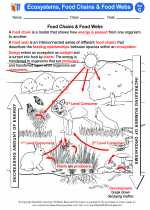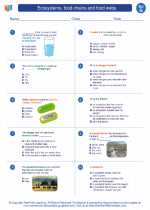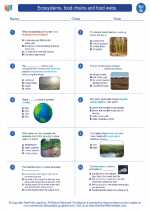Ecosystems, food chains and food webs -> weathering
Mechanical Weathering
Mechanical weathering occurs when physical forces break rocks into smaller pieces without changing their chemical composition. Some of the main processes involved in mechanical weathering include:
- Frost Wedging: Water seeps into cracks in rocks and then freezes, expanding and causing the rock to break apart.
- Root Wedging: Plant roots grow into cracks in rocks, exerting pressure and causing the rock to break apart.
- Abrasion: Rocks and particles carried by wind, water, or ice can wear down other rocks through friction.
Chemical Weathering
Chemical weathering involves the alteration of a rock's chemical composition through processes such as:
- Hydrolysis: Water reacts with minerals in the rock, breaking them down into new minerals.
- Oxidation: Oxygen combines with certain minerals in the rock, causing them to rust or change color.
- Carbonation: Carbon dioxide from the atmosphere dissolves in rainwater, forming a weak acid that can dissolve minerals in the rock.
Study Guide
When studying weathering, it's important to understand the different processes involved in both mechanical and chemical weathering. Make sure to review examples of each type of weathering and how they occur in various environments. Additionally, it's helpful to understand how weathering contributes to the formation of soil and the Earth's landscape over time.
Practice identifying examples of weathering in your surroundings, such as cracked sidewalks, eroded cliffs, or weathered statues. Understanding how weathering shapes the Earth's surface is crucial for comprehending the larger processes of erosion, deposition, and sedimentation.
.◂Science Worksheets and Study Guides Seventh Grade. Ecosystems, food chains and food webs

 Activity Lesson
Activity Lesson
 Worksheet/Answer key
Worksheet/Answer key
 Worksheet/Answer key
Worksheet/Answer key
 Worksheet/Answer key
Worksheet/Answer key
 Vocabulary/Answer key
Vocabulary/Answer key
 Vocabulary/Answer key
Vocabulary/Answer key
 Vocabulary/Answer key
Vocabulary/Answer key
 Vocabulary/Answer key
Vocabulary/Answer key
 Vocabulary/Answer key
Vocabulary/Answer key
